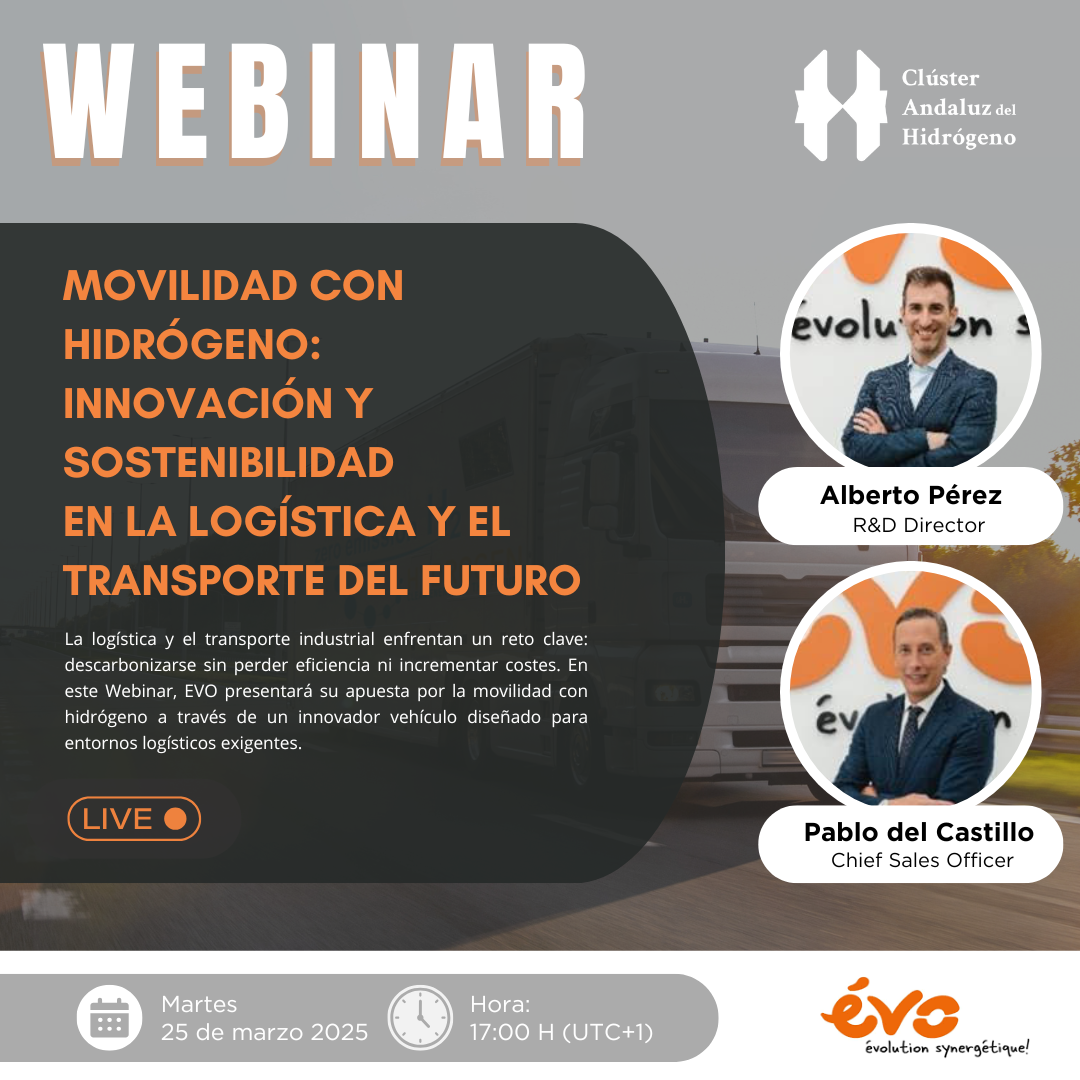Seville, April 7, 2025 – During a webinar hosted by the Andalusian Hydrogen Cluster, the Spanish company EVO, specializing in sustainable electromobility, presented one of its most advanced technological solutions to date: a zero-emission electric vehicle designed for intensive logistics applications, including ports, airports, and distribution centers.
The Terminal Tractor is a hybrid industrial vehicle powered by a hydrogen fuel cell and a High Voltage battery, engineered to deliver peak performance in logistics environments. It is built to maintain consistent output in high-demand operations, offering fast refueling in just a few minutes, extended range, minimal downtime, and a towing capacity of up to 95 tons. The tractor integrates a 75 kW fuel cell, a 310 kW traction motor, and a hydrogen storage system at 350 bar. These are all managed by intelligent algorithms that optimize energy use, extend component life, and lower operating costs.
Conceived to merge efficiency, operational continuity, and sustainability, the Terminal Tractor is based on EVO’s proprietary platform, which adapts to various energy configurations and specific operational requirements.
EVO has developed a modular and scalable architecture with safety as the cornerstone of the project. Its design includes physical barriers separating the hydrogen and high-voltage systems, electronic leak detection measures, 5G connectivity with the control center, and remote software updates for the vehicle’s control unit. The entire system has been developed in adherence with the industry’s most stringent automotive standards, including AUTOSAR and ISO 26262, ensuring reliability, robustness, and protection against cyberattacks.
Thanks to the integration of AI and digital twin technology, the vehicle offers advanced capabilities in fleet management, predictive maintenance, driver assistance, route planning, and real-time adaptation to its environment. It can synchronize with other infrastructure and vehicles, anticipate on-route issues, and optimize operational performance in real time.
Moreover, EVO has incorporated a custom thermal management system that keeps all components within their optimal operating range, even under extreme conditions such as those found in cities with extremely hot summers. This ensures operational stability and prevents system degradation.
Field testing of the Terminal Tractor will take place in real-world environments starting in the second half of 2025, with the official launch scheduled for July. With this project, EVO reinforces its position as a European technological leader in zero-emission industrial mobility and showcases how Spanish innovation can shape the future of heavy-duty transportation.

The presentation was led by Sales Director Pablo del Castillo and Innovation Director Alberto Pérez, who highlighted EVO’s technological proposition, emphasizing green hydrogen as a key energy vector for sustainable mobility. In this regard, EVO is committed to green hydrogen as an essential component for achieving total decarbonization of high-intensity sectors such as aviation, maritime transport, and industrial machinery.
With offices in Seville, Barcelona, and Munich and a multidisciplinary team of 75 and growing, EVO has delivered over 40 electromobility projects across Europe and has been recognized as an innovative SME. Currently, it is the only Spanish company chosen to participate in IPCEI H2Move, a strategic European project involving 11 companies from 7 countries to drive new hydrogen mobility solutions.
EVO provides turnkey solutions encompassing everything from conceptual design to series production, meeting the highest industry standards. Its expanding team includes experts in software, hardware, systems, mechanics, cybersecurity, quality, and functional safety. Through an integrated approach—vehicle, components, and systems—EVO delivers customized products and solutions for OEMs and Tier 1 suppliers.
The H2 Tractor project has been funded by the European Union–NextGenerationEU under the Recovery, Transformation, and Resilience Plan, Incentives Program 2: Design, Demonstration, and Validation of Hydrogen-Powered Mobility. Nevertheless, the views and opinions expressed herein are solely those of the authors and do not necessarily reflect those of the European Union or the European Commission, which bear no responsibility for them.
